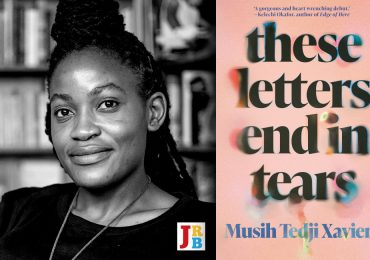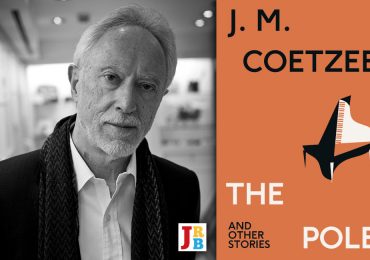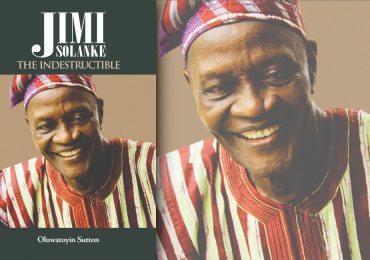The JRB Editor Jennifer Malec reviews Lauren Wilkinson’s debut novel American Spy, a thriller that exposes the human drama that plays out in the wings of the theatre of politics.
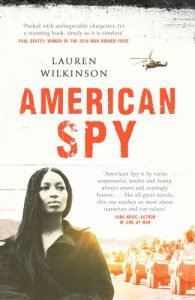
American Spy
Lauren Wilkinson
Little, Brown, 2019
In the midst of our never-ending, hysterical political moment, it is almost a relief to return to the relatively simple times of the Cold War, with its good, old-fashioned double-crossing, where the biggest surprise is the now laughably simple idea of the triple-agent, where you can trust a spy’s word to be either true or false, untainted by post-truth alternative facts. American Spy, Lauren Wilkinson’s debut, is set during those halcyon days, playing out in the early nineteen-sixties to the early nineteen-nineties, in New York, Burkina Faso and Martinique.
The novel opens in 1992, its present day, with a woman waking to a strange sound in her house. In the first line she steps on a piece of Lego, and within a couple of paragraphs she’s grappling with an armed man:
He went for my neck again, and as he started to squeeze I reached behind me, flailing my arms, hoping to find the fallen lamp in the dark; instead my fingers curled around a 9mm that didn’t belong to me. I lifted it to the man’s temple. Squeezed the trigger.
In other words, the novels kicks off to a dramatic, violent start. But then, the woman’s five-year-old twins walk in, and it becomes clear that American Spy is expanding the borders of the espionage thriller.
Into the world of the Cold War, firmly established in our collective imaginary as a space dominated by powerful white men, enters Marie Mitchell, a young, female, African American FBI agent and single mother. Much of the novel is written as a letter from Marie to her sons, ‘just in case I’m not around to tell you’. American Spy reimagines the American spy, and brings gender and race into the war room.
As Marie says of the New York field office where she works:
A sense of self-importance permeated the culture. So did machismo and knee-jerk conservatism. To get by, I told my colleagues that I didn’t care about politics, which felt like a ridiculous thing to claim. They bought it though. Very few of those men understood having no choice about whether they were political or not: Unlike me, they weren’t people who’d had their existence politicised on their behalf.
But gender and race are not nails, and American Spy is not a hammer. Marie’s blackness and femaleness, and how she defies their constraints, are, of course, central, but unlike a detached, hard-boiled private dick she is intricately connected to her world. She has depth, although this depth is revealed slowly: because of her precarious existence Marie is miserly with her secrets, which adds to the novel’s air of intrigue. As a black person who grew up in nineteen-seventies New York, she is intrinsically well-versed in the art of espionage. Marie’s father, a retired policeman, says to her just before her graduation from Quantico:
You don’t owe them anything. You give them what you want to give them. But it’s easier if they think you’re one of them. It’s easier to work from the inside. That’s what I try to do. I’ve been a spy in this country for as long as I can remember.
Because of how she looks and who she is, Marie is inherently subversive, but she’s also an all-American hero, a triple threat: sporty, academically gifted, and possessed of a healthy, innate belief in American imperialism. So when she is approached by the CIA to help destabilise Burkina Faso’s new Marxist revolutionary government, she accepts.
Although Marie admits to respecting the socialist policies of Burkinabé leader Thomas Sankara—especially in the context of Reaganomics’ increased military spending at the cost of the US social safety net, which had created ‘a gap between the rich and the poor that was yawning wider every year; one that we felt harder than most’—she also believes Communism is dangerous:
The problem with the good [Sankara] was doing was that it made his Communism palatable. He was too charismatic. Although his country was one of the poorest in the world, he had still managed to galvanise support across the continent. It was worrisome when that happened in countries that had recently become independent. Because they were no longer under the control of a colonial power, there were ideological vacuums in those countries. And I understood the fear that Communism would rush in and fill those voids.
Marie’s baldly pragmatic view of newly independent African countries rankles, but to be fair it is part of a generally unsentimental outlook that is, for the main part, admirable. When she arrives in Ouagadougou, Marie’s attitude to the country is refreshingly detached. She does not expect to be transformed by Africa, but there’s also an absence of first world arrogance. On her first day, she attempts to go for a walk, but only manages to get a few blocks before turning back, ‘brutalised by the heat’. We’ve been introduced to her as someone stubbornly determined in the face of failure, but she accepts this defeat with equanimity. Similarly, when she’s unable to recognise or identify items for sale, or even to establish which buildings are shops, she decides to stick to places where the wealthy and tourists hang out, accepting quickly that she’s unsuited for certain areas or restaurants. She finds herself craving sugar. ‘Every day I spent in Burkina Faso was a reminder of how American I was,’ she says:
And although I found it difficult to be there, I thought it was good for me too, because it took me out of my usual context. There was the language, the new culture, the fact that in the United States I thought of myself as black before I thought of myself as American. In Ouagadougou, routinely, those designations were reversed: People saw me as American first. The American. I can’t say I preferred it that way, but it gave me a new perspective.
Even in her relationship with the cook at her guesthouse, Djeneba, who is disinclined to engage her in conversation beyond greetings and details about breakfast, Marie demonstrates a refreshing dispassion: ‘Her attitude didn’t seem like rudeness, obsequiousness, or timidity—it seemed to reflect a sincere and complete lack of interest in me. I respected that.’
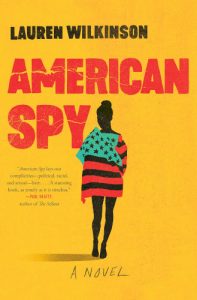
(At this point, it seems pertinent to mention that, despite the illustration on the North American edition of the book, at no point does Marie wander down the street scantily clad in nothing but the American flag. In the context of such a nuanced portrait of an American’s experience of Burkina Faso, the jacket design is galling, to say the least.)
Marie greets her new mission—to seduce Sankara and compromise his image—with the same mild acceptance, even after realising she feels a strong personal, and physical, connection with him. She does so for both professional and private reasons: in travelling to Burkina Faso she will be able to meet with someone who has information about the death of her sister, Helene. But one morning, after waking especially early to have a shower, she walks back into her bedroom to find a man, Slater, whom she thought was CIA, lying on her bed, waiting for her. Slater, who she has only had a professional relationship with, utters some of the most chilling lines I can ever remember reading:
‘I was hoping you’d still be asleep,’ he said. ‘You snore. You’re not a beautiful sleeper, which I like. That’s how Helene was too.’
And so the double crossing begins.
The plot of American Spy does not suffer from the tangled overcomplication that is typical of many espionage novels. Perhaps the Cold War setting helps here, but at no point is it necessary to flip back a few chapters to try and figure out what the hell is going on. This is not to say the plot is not gratifyingly devious—it is—or that the novel does not flick backwards and forwards in time—it does—but each decade becomes almost its own genre, which provides a sort of stylistic anchor by which to navigate the story.
Apart from the satisfyingly twisty storyline, there’s also an audacity in the characterisation of Thomas Sankara that requires the reader to grant American Spy a certain level of latitude. Some readers may balk at this fictionalised version of Sankara, who would entertain the idea of a clandestine love affair with someone he knows to be a spy. But this is also one of the book’s strengths: exposing the complex human drama that plays out in the wings of the theatre of politics.
Apart from its main character, American Spy is marked by the presence of absent women, and while the novel is stuffed with striking male characters for Marie to interact with, it is her relationships with her sister and mother that form the emotional core of the book. Marie’s mother, Agathe, abandons her family to live in Martinique when Marie is just seven years old, causing a lasting rift. But Marie is self-aware enough to acknowledge the existence of an affiliation that cannot be disrupted by geographical distance. At one point Marie says of Agathe, a light-skinned woman who was coerced into ‘passing’ for white as a child:
Our mother could pass; she could hide in plain sight. And then one day she suddenly left us. That is all a spy does—they hide in plain sight, and once they’ve exploited all they can from their relationships, they leave.
Helene, too, abandons her younger sister, but it is through no fault of her own. Two years older than Marie, she is the one who takes care of her after their mother leaves, making her packed lunches and plaiting her hair, and she is the one obsessed with becoming a spy from an early age. When she breaks the news to their father that she has enlisted in the army to become an intelligence officer, he is furious that she has chosen military service over further education. The decision takes him and Marie completely by surprise, and because of the family friction, while Helene is in training Marie is barely in contact with her. When Helene dies in a car accident, just after returning safely from a tour in Vietnam, Marie alters her career path to become a Fed, in honour of her sister.
Marie is the smart one—she is skipped ahead a grade at school, and at Quantico she scores highest in her class in academics—and throughout the novel she’s confident that she is able to outsmart those around her. Unfortunately for Marie, it is precisely her ability to see two steps ahead that enables shadowy forces to manipulate her, and she’s forced to re-evaluate her principles. As she writes to her sons:
One thing I can say for sure is that I don’t want you to be moral absolutists. If what I’m telling you of our story means to you that the people it involves are either saved or damned, then you’ll have misunderstood me.
***
Thrillers are still widely looked down upon by serious readers, those who proclaim allegiance to the ‘literary’. Unbeknown to them is the fact that these types of books—bestselling crime fiction, detective fiction, spy fiction—are often the secret pleasure of the very authors who are eking out a meagre living writing highbrow, award-festooned work.
This discord is not new. Anthony Trollope, in his book An Autobiography, which was posthumously released in 1883, wrote about the division between sensational and anti-sensational, or ‘realistic’, novels—the former, he said, being driven by plot, the latter by character.
‘All this is, I think, a mistake,’ Trollope wrote, ‘which mistake arises from the inability of the imperfect artist to be at the same time realistic and sensational. A good novel should be both, and both in the highest degree… Truth let there be—truth of description, truth of character, human truth as to men and women. If there be such truth, I do not know that a novel can be too sensational.’ Perhaps it is because these ‘perfect’ writers, writers who effortlessly combine realism with sensationalism, are so hard to come by that those in the know gravitate, secretly, towards airport paperbacks.
As the author of a well-crafted, well-plotted thriller that penetrates the social fabric it is woven from, and which offers the reader a well-rounded, confident woman protagonist rooted by meaningful human relationships, Wilkinson emulates some trailblazing women crime writers. The legendary Sara Paretsky, whose first book was published in 1982, created the character VI Warshawski, a tough, smart-talking private investigator from Chicago, as a response to the conventional, male, hard-boiled detective. VI is a challenge to the myth of the lone private eye, isolated from society. She often investigates cases involving her friends and family, and the novels explore social issues such as abortion rights and big pharma, organised crime and corporate corruption, and even the aftermath of 9/11.
While certain early writers of formulaic pulp fiction did enrich their work with cultural commentary—Dashiell Hammett and Raymond Chandler wrote authentically about the social upheaval in America in the nineteen-twenties and thirties—with a woman author comes something more. As PD James wrote in her book Talking About Detective Fiction, writers like Agatha Christie, Dorothy L Sayers, Margery Allingham and Ngaio Marsh—the four original ‘Queens of Crime’, who wrote during what is known as the Golden Age of detective fiction in the nineteen-twenties and thirties—enabled the reader to ‘learn more about the England in which they lived and worked than most popular social histories, and in particular about the status of women in the years between the wars’. These writers, according to James:
aspired to, and achieved, a standard of writing and characterisation which helped to raise the reputation of the detective story from a harmless but predictable literary diversion into a popular form that could be taken as seriously as a well-written mainstream novel.
Today, writers such as Wilkinson are taking the genre novel one step further. American Spy is a welcome tonic for thriller fans who crave good writing and a page-turning plot, but who are becoming disillusioned with the increasingly unrealistic white bread atmosphere that continues to dominate the genre. If the pinnacle of good writing is indeed ‘truth of description, truth of character, human truth as to men and women’, we need more books like American Spy.

